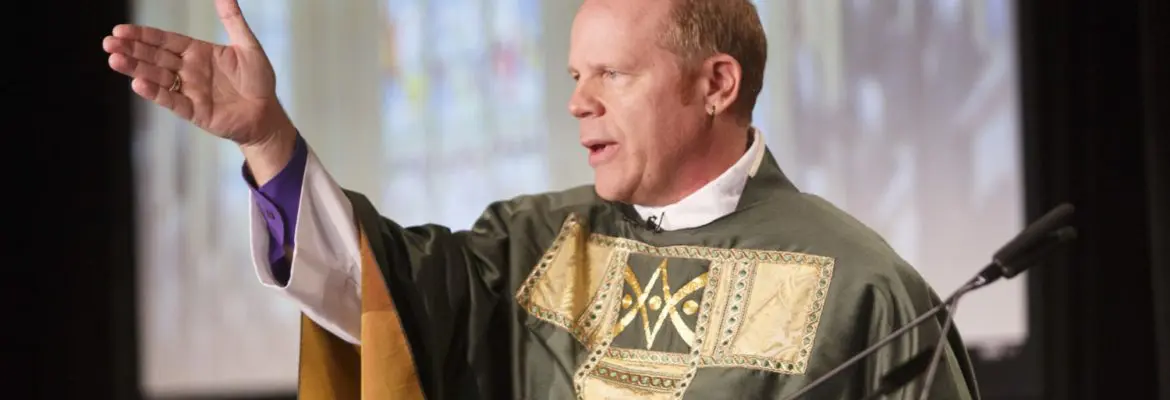
Dear Friends in Christ:
I don’t need to tell you that the Diocese of Toronto is blessed with some great intellects among our clergy and laity. I am privileged to receive, from time to time, thoughtful papers from members of this Diocese who have taken the time to consider weighty questions, or who have been giving careful consideration to certain matters of faith, doctrine and the practices of the Church. During the pandemic, there has been lots of scope for reflection and study, on topics both new and old, and I am sometimes the beneficiary of that wisdom.
The Rev. Canon John Hill is one of the great thinkers and liturgists of our Diocese. Earlier in February, he shared with the College of Bishops a short paper on “The Interdependence of Dinner Table and Lord’s Table”. We were so engaged by his reflections that I asked him if I might relay some of his thoughts with you this Lent, as the pandemic restrictions currently continue to prevent most of us from gathering at the altar. I am grateful for his wisdom, and his permission to share it with you.
Many of you know that the origins of the Eucharist come from ancient rituals of the dining table. The Last Supper that Jesus celebrated with his disciples was an established rite that would have been familiar from the banqueting traditions of their time and culture as observant Jews. What we celebrate now in church on Sunday mornings is an evolution of those traditions, but it is almost unrecognizable as a modern-day traditional family meal. We would do well to recollect that what happens at our dining room tables can, and should – especially in this season where we are under ‘stay-at-home’ orders and necessarily separated from church – be a gathering of the people of God, and its own foretaste of the heavenly banquet.
Some of us remember when the dinner hour was the apex of a family’s day. It used to be that households would come together for supper, like clockwork, gathering around the dining room table. Not only were people coming together to nourish their bodies with food, but they also would feed their common life together by giving thanks together, by sharing news and story-telling. Traditions and customs were maintained and continued, including the teaching of table etiquette. It is still the case that we usually gather around mealtimes for family celebrations. But busy modern living has made the daily habit of sitting-down-to-dinner atypical in many homes. Additionally, we are often far removed from the sources and production of our food and take its ease of access for granted. Giving thanks and blessing the food with a table grace before eating is increasingly rare.
The phrase “domestic church” (or the “little church” as St. John Chrysostom preferred) was used by many Church Fathers, especially St. Augustine of Hippo. During this pandemic, when the Christian community is necessarily separated due to safety concerns and gathering restrictions, we can rediscover – and have! – the importance of the domestic church: the living out of our faith at home, in the company of our household. While we are all blessed by the technology that allows us to participate in gathered online worship – a true life-line for those who live alone especially – for some of us, our families at home have become again our primary community of the faithful.
How can we renew our rituals of the dinner table to become again for us an opportunity for faith formation? The Church Fathers emphasized the reading of scripture together in the domestic church. Praying together, especially taking the time to give thanks for and bless the food we share, can become a chance to recollect the actions of the Last Supper. If you have fallen out of the practice of saying grace before meals, why not start again? If your table grace has become stale or “rote”, perhaps it is time to refresh it. Call to mind the celebration of the Eucharist as you gather around your food and share it, whether a loaf of bread and a bottle of wine, or a casserole or a pizza. Recollect God’s presence in your midst and the saving acts of Christ as you give thanks for your blessings of food and drink. In the words of John Hill, “a renewal of the dinner table…would still not be the Eucharist, but it could nevertheless be a ‘meal of remembrance’”. We can “recognize the essential relationship of interdependence between the domestic church and parish church, between the dinner table and the holy table, …[and] restore foundations for the renewal of the parish liturgy when it returns.”
I encourage you this Lent to review your devotional practices around dining, whether it is alone or with your household. Consider reading scripture together. Refresh your practice of saying grace before eating; some wonderful table prayers have been provided by John Hill HERE.
Let me know how your little church, your domestic church, is practicing your piety during this time.
Yours in Christ,
The Rt. Rev. Andrew Asbil
Bishop of Toronto